Salisbury Novichok poisoning: Russian nationals named as suspects
Two Russian nationals have been named as suspects in the attempted murder of former Russian spy Sergei Skripal and his daughter Yulia.
The men, using the names Alexander Petrov and Ruslan Boshirov, are thought to be officers from Russia's military intelligence service, the PM said.
Scotland Yard and the CPS say there is enough evidence to charge the men.
Mr Skripal, 66, and his daughter Yulia, 33, were poisoned with the nerve agent Novichok in March.
Det Sgt Nick Bailey also fell ill after responding to the incident in Salisbury.
Police are linking the attack to a separate Novichok poisoning on 30 June, when Dawn Sturgess and Charlie Rowley became unwell at a house in Amesbury, about eight miles from Salisbury.
Ms Sturgess died in hospital on 8 July. Mr Rowley was discharged from hospital on 20 July.
Speaking to ITV News on Wednesday, he said he wanted to see the suspects "brought to justice".
Speaking in the Commons, Prime Minister Theresa May said the government had concluded, from intelligence provided by UK agencies, that the men were part of the GRU intelligence service.
The poisoning was "not a rogue operation" and was "almost certainly" approved at a senior level of the Russian state, she said.
The two suspects, believed to have been using aliases, travelled on Russian passports and are thought to be aged about 40.
The BBC's security correspondent Gordon Corera said he understood the authorities identified the pair "a while back" and "may also know their real names" and had hoped by not making this information public, they could intercept them should they continue to travel.
He said there was little expectation that the pair would end up in a British court, but releasing the evidence would instead add pressure with the intention of "deterring Russia from doing something similar again".
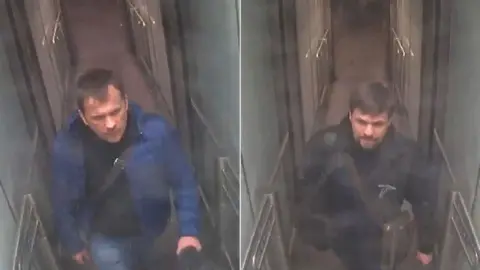 Met Police
Met Police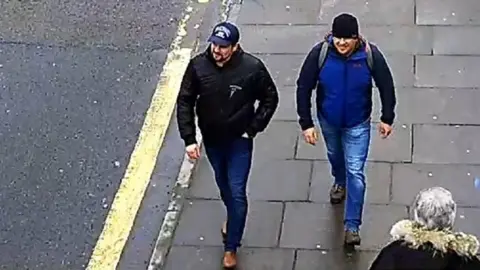 Met Police
Met Police"We must now step up our collective efforts specifically against the GRU," Mrs May said on Wednesday.
She condemned the "despicable attack" and promised "the full range of tools from across our national security apparatus" would be used to "counter the threat" caused by Russia.
Responding in a statement, Russia's London embassy called on the British government to "give up politicised public accusations".
The embassy statement accused the UK authorities of being unwilling to engage with them, by providing additional information about the suspects such as their passport numbers.
Labour leader Jeremy Corbyn said the use of military-grade nerve agent on the streets of Britain was an "outrage and beyond reckless".
The CPS is not applying to Russia for the extradition of the two men, as Russia does not extradite its own nationals.
But a European Arrest Warrant has been obtained in case they travel to the EU.
Russian President Vladimir Putin's foreign policy adviser Yuri Ushakov told reporters the names of the Russian suspects "do not mean anything to me".
The UK will meet the UN security council to discuss the case on Thursday.
Mrs May also said Britain would push for the EU to agree new sanctions against Russia.
But BBC diplomatic correspondent James Landale said many European countries would be "reluctant to tighten the screw on Russia", fearing a loss of trade and energy.
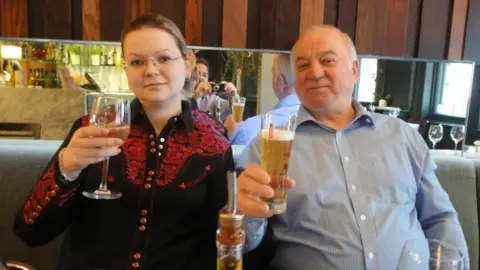
Sue Hemming, CPS director of legal services, said there was enough evidence "to provide a realistic prospect of conviction" and that it was "clearly in the public interest" to bring charges.
The offences include conspiracy to murder Sergei Skripal; the attempted murder of Sergei Skripal, Yulia Skripal and Nick Bailey; the use and possession of Novichok contrary to the Chemical Weapons Act; and causing grievous bodily harm with intent to Yulia Skripal and Nick Bailey.
Scotland Yard's Neil Basu, the head of UK counter-terrorism policing, said that Det Sgt Bailey "continues to make good progress but remains off work".

What happens now?
Analysis by BBC diplomatic correspondent Jonathan Marcus
The decision to identify two named Russian individuals in the Skripal case as agents of the Military Intelligence Service - the GRU - is a significant development. It raises the level of evidence on which the UK government's charges are based and potentially gives added weight to calls for additional international sanctions against Moscow.
This evidence will be presented to the UN Security Council later this week.
Already messages have been exchanged between London and Moscow; the British Ambassador there seeing a senior Russian official and a Russian diplomat going into the foreign office here in London.
But given that it is highly unlikely that these men will ever face trial, what happens now?
The prime minister put her emphasis upon bolstering western democracies' defences - not just in purely military terms, but specifically in countering the powerful intelligence arm of the Russian armed forces, the GRU.

What is the GRU?
Analysis by BBC security correspondent Frank Gardner
Less famous than the KGB - or its successor, the FSB - the GRU plays a shadowy but important role in Moscow's strategic plans.
It is Russia's military intelligence arm, reporting directly to the defence minister. It has extensive cyber and signals operations and has been accused of hacking and online sabotage.
GRU officers are often stationed in embassies around the world and many were expelled after the Salisbury attack in March.
Since 2013 Russia's elite Spetznaz (Special Purpose) Special Forces have been part of the GRU's command structure and are believed to have played a part in the annexation of Crimea in 2014. British government officials maintain that the GRU's operations include assassinations both inside Russia and overseas.
Sergei Skripal served in the GRU as a military intelligence officer in Afghanistan in the 1980s. In 2006 he was arrested and jailed after reportedly betraying the names of his GRU colleagues to Britain's MI6. In 2010 he was allowed to leave for Britain as part of a prisoner swap, but in the Kremlin's eyes he will always be seen as a traitor.

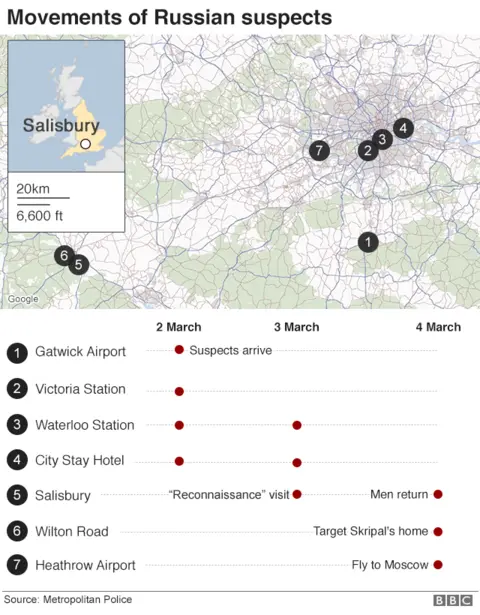

The Metropolitan Police said the two men arrived at Gatwick Airport from Moscow on 2 March and stayed at the City Stay Hotel in Bow Road, east London.
On 4 March they travelled to Salisbury - having also visited for reconnaissance the previous day - where Mr Skripal's front door was contaminated with Novichok.
Officers believe a modified perfume bottle was used to spray the door.
The pair flew from Heathrow to Moscow later that night.
While traces of Novichok were found in the London hotel room, there is no risk to other guests who were staying at the hotel at the time, police said.
They now want to hear from anyone who was a guest there from 4 March to 4 May.
London Mayor Sadiq Khan said he had been assured there was no risk to public health in London.
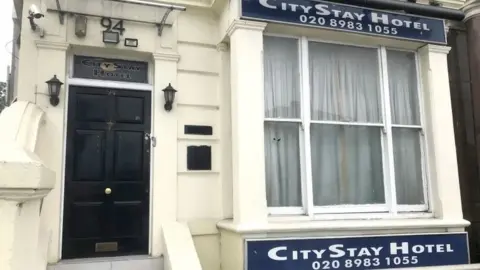 PA
PAPolice said Ms Sturgess and Mr Rowley were later exposed to Novichok after handling a contaminated container, labelled as Nina Ricci Premier Jour perfume.
Mr Rowley told police he found the box containing the small bottle and an applicator - all found to be counterfeit - in a charity bin.
He tried to put the two parts together and got some of the contents on himself. His partner Ms Sturgess applied some of the contents to her wrists and became unwell.
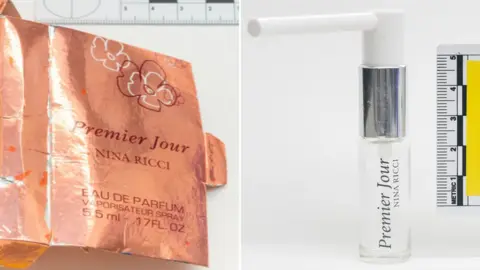 AFP/Met Police
AFP/Met Police The bottle, with a modified nozzle, had contained a "significant amount" of Novichok, Scotland Yard said.
Mr Basu said: "We don't yet know where the suspects disposed of the Novichok they used to attack the door, where Dawn and Charlie got the bottle that poisoned them, or if it is the same bottle used in both poisonings."
But he added that the adapted bottle and packaging made it "a perfect cover for smuggling the weapon into the country, and a perfect delivery method for the attack against the Skripal's front door".
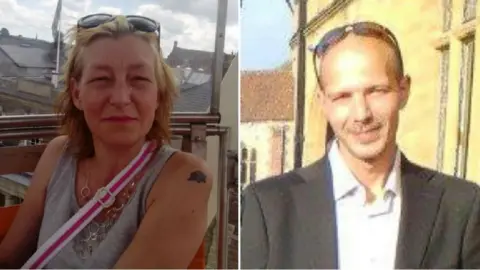 Facebook
FacebookMr Basu confirmed the two poisoning cases were related.
"It now forms one investigation," he said. "We do not believe Dawn and Charlie were deliberately targeted, but became victims as a result of the recklessness in which such a toxic nerve agent was disposed of."
